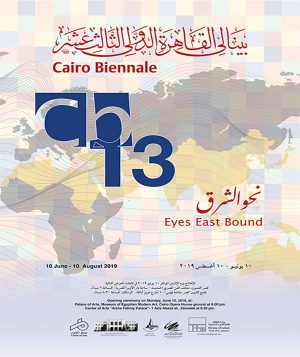The 13th Cairo Biennale
Eyes East Bound
10 June – 10 August 2019
Eyes from every corner of the globe are currently directing their scrutinizing regards towards the East; an East with an ancient and deeply rooted cultural overload, in the core of which is our Middle East, that part of the planet that is immersed in –rather “overwhelmed by– an infinite number of social, political and economic issues, all aggravating and disseminating intricately to entangle –and concern– the whole world.
One is sometimes obliged to think and hypothesize that it is perhaps some stakeholders in the power game from “that” world that are actual players in the development of Middle East events, as we see them climaxing more and more every day, sometimes backfiring in the face of stakeholders and observers alike, and at other times offering more open and promising horizons.
Our East –if one is able to summarize it in concept into one word– on the other hand, has an eye on the future, somehow without losing sight of a cumulative and wealthy cultural heritage; one that has developed with layers of palimpsest and of a detritus of knowledge over centuries that has impacted and influenced most modern world cultures. Such a present heritage still inspires and directs attitudes, traditions, conventions, and continuously forms the cultural specificity of many Eastern communities.
The problematic of terms like “Middle East” –created by geo-politicians to describe an effervescent part of the world— is that “terms of the sort” are only capable of addressing only a limited political description, and are neither hospitable nor versatile enough to address the more complex nature of the profound and intertwined cultures of the demographics they describe. The core of the East, formerly approached as the “Orient”, must not – in our opinion– be approached from any geo-political perspective. We can identify four pillars for an objective analysis that need to be approached in sequence: the social, the cultural, the patrimonial, and only then the political.
Art history documented how –in the past two centuries– Orientalism and the fascination by the Oriental traditions swept the West, its architecture, its fancy and exotic fashion, and foremost its culture –as if there was one sole culture to savor; that was authentic fascination, inspiring, despite an occasional deviation towards clichés and towards exoticism.
We are attempting to take a distance form approaching the political facet of the East, our Orient, and deflecting from what became the cliché approach to explore the Middle East from a political discourse, with its controversial analysis and hypothetical moots, serving in most cases one ideological agenda or another, a particular theory or a preset interest. From that Orient we are extending an invitation to explore the heart of this East, that inspiring Orient which gave birth to several colossal civilizations, cultures that interacted with the other, hosted and blended with all and every other, to form an ultimate universal language, accessible to all, without isolation and without marginalization. Sheer creativity and only creators can attain such positive and voluntary “alienation”, a required separation from the political real to the quest for an objective core of the authentic. The creator withdraws inspiration, while politics, though an ambient source devours all creativity.
The 13th Cairo Biennale, in a quest for an authentic dialogue alternative to what is proposed in cliché channels today, and while not attempting to dictate, guide or direct creators towards particular approaches, extends its invitation to artists to set their compasses to the East, their eyes to an alternative Orient, examine with us the four pillars that are our perceived real, and probe with us all possible horizons in every possible medium of expression.
Participating Artists
Ariel Hassan / Argentina
Fani Zguro / Albania
Amina Zoubir / Algeria
Christian Lock / Australia
Brigitte kowanz / Austria
Joris Van de Moortel / Belgium
Mladen Miljanovic / Bosnia
Alexandre Murucci / Brazil
Hyacinthe Ouattara / Burkina Faso
Ajarb Bernard Ategwa / Cameroon
Ljubodrag Andric / Canada
José Abásolo & Félix Reigada / Chile
Aaajiao / China
Camilo Arias / Columbia
Ngimbi Luve / Congo
Ernest Duku / Cote d’Ivoire
Josip Zanki / Croatia
Melina Nicolaides / Cyprus
Ahmed Badry / Egypt
Ahmed Kassim / Egypt
Essam Darwish / Egypt
Hazem El Mestikawy / Egypt
Marwa Adel / Egypt
Reda Abdel Rahman / Egypt
Youssef Nabil / Egypt
Antoine Tempe / France
Emmanuel Tussore / France
Astrid Menze & Julia Neuenhausen / Germany
Johannes Vogl / Germany
Rina Banerjee / India
Mahmoud obaidi / Iraq
Sadik Kwaish Al Fraji / Iraq
Serwan Baran / Iraq
Maimouna Guerresi / Italy
Paolo Dolzan / Italy
Almagul Menlibayeva / Kazakhstan
Ayman Yousri / Jordan
Rashed Al Shashai / KSA
Sarah Al-Abdali / KSA
Farah Behbehani / Kuwait
Ayman Baalbaki / Lebanon
Zoran Poposki / Macedonia
Oumar Ball / Mauritania
José luis ramírez rodríguez / Mexico
Mohamed Bourouissa / Algeria
Emeka Okereke / Nigeria
Hazem Harb / Palestine
Nikki Luna / Philippines
Aidan Salakhova / Russia
Malick Welli / Senegal
Sérigne Ibrahima Dieye / Senegal
Eva Petric / Slovenia
Tobias Putrih / Slovenia
Adam Broomberg & Oliver Chanarin / South Africa
Kim Heecheon / South Korea
Max De Esteban / Spain
Daniel Frank / Switzerland
Ursula Palla / Switzerland
Victorine Müller / Switzerland
Houssam Ballan / Syria
Mohamad Hafez / Syria
Mohammad Zaza / Syria
Sutthirat Supaparinya / Thailand
Thameur Mejri / Tunisia
Ammar Al Attar / UAE
Mattar Bin Lahej / UAE
Sanaa Gateja / Uganda
Natalia Mali / UK
Konantü / USA
Robert Roesch / USA
Sama Alshaibi / USA
Suzanne Reese Horvitz / USA
Jaime Castro Oroztegui / Venezuela
Admire Kamudzengerere / Zimbabwe


